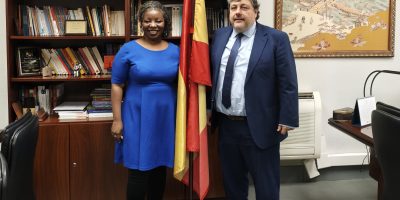Don’t judge a book by its cover: The FernUniversität library is a hive of activity

Doing things by the book is cause to smile for librarian Jutta Stöppel
What is your role at the library? How long have you worked there?
I have worked at the university library for almost 5 years now and my job title is Mediendidaktikerin – an educational technologist, one might say.
I work in the services department (in German: Dezernat 3: Benutzung und Information). You’ll see my colleagues (and sometimes me) at the circulation desk, putting books and magazines back onto the shelves after they have been used or returned, but we also take books out, issue them and get them ready to be sent out to our students. Furthermore, we also scan articles from magazines that are not available online and deal with interlibrary loans, i.e. books that we don’t stock but that can be ordered from other libraries. However, this is just a tiny fraction of the things we all do. There’s actually a plethora of things that need to be done ‘behind the scenes’ in order to keep the library running which the average library user is not really aware of. I wasn’t either before I started working here.
Another big part of our work is answering our users’ queries via email, telephone, chat, social media and of course in person. The scope of the questions is very wide and ranges from short questions like “Can I come and learn in the library?” (Of course you can!) to meetings via Zoom in order to assist with issues that are difficult to resolve on the phone or in writing. Of course, we also get questions every day regarding the use of our catalogue system and how our library “works”, i.e. how our patrons can order and receive printed books and articles, use databases and retrieve e-books or online articles.
And that’s basically, where I come in: I regularly offer online introductions (including some research exercises) into how to use the library, e.g. how to order books, how to find and use e-books and how to search, retrieve or order scientific articles.
I’ve been teaching for over 25 years, so that’s something I really enjoy – whether we have a small-ish group with 10-25 students or large first semester sessions with up to a few hundred excited new students joining. While I also like training students in-person, teaching online is even more up my alley. It’s certainly not “only” online (as we heard in a lot of meetings during the pandemic), but offers several opportunities we need to embrace. So many of our students wouldn’t be able to attend in person – maybe because they live far away, are not mobile, need to look after family members or don’t want to spend too much time (or money) on travelling, etc. And that’s exactly why they chose to study at a distance university. I also think we haven’t yet tapped into the full potential that online teaching offers, and I’m looking forward to seeing how things will develop over the next few years.
In addition to the online tutorials, I create a lot of different information and learning materials in different (usually digital) formats, e.g. Moodle content, quizzes, tutorials etc. Since I started at the library, I also get to create our Advent Quiz, which our patrons can solve in December (and win prizes). These are well-earned because the quiz is pretty complex!
Together with my colleague Ronja Böker, I also run our social media accounts on Twitter (@ubhagen) and Mastodon (@ubhagen@openbiblio.social). Sounds like fun? Well, it certainly can be, but it also takes more time and effort than one might think. Apart from all the above-mentioned things, I’m also involved in quite a few projects – both internal and external. So, you see, it really never gets boring, whether I’m in the office in Hagen or working remotely from East-Westphalia, where I live.
What did you study and where?
Back in the 1990s, I studied Biology, English and Pedagogy to become a teacher at Bielefeld University. But then – around 1998 and just before taking the final exams – I went into adult education instead and worked as an English language trainer, teaching (so-called) Business English to many, many employees in small, medium-sized and large, multinational companies in the East-Westphalia region.
In the late 2000s, I started studying the B.A. Bildungswissenschaft at the FernUniversität in Hagen, which I finished in 2018. Currently, I’m doing the M.A. Bildungswissenschaft at the FernUni which I hope to complete next year. Just one more term paper and the master’s thesis to go!
How many languages do you speak? How often do you get to use them and in what sort of scenarios?
I speak German and English. Of course, I speak German every day; it’s my native language and I live and work and study here. I’m not using my English as much as I did when I still worked as a language trainer, but I still use it with friends and acquaintances around the globe online, and of course I watch movies or videos and read books or texts for my studies in English.
At school, I also learned French. I still know some of it today but have very little opportunity to practise it. I can understand quite a bit in both reading and listening, but speaking is tricky. I think I last actively used it when I travelled to Montreal and Quebec in Canada many moons and one pandemic ago.
While studying in Bielefeld, I had to do the so-called Latinum (Latin). But I suppose I’ve forgotten most of that by now.
Over the years I’ve looked into quite a few more languages, e.g. Italian, Finnish, Portuguese and Spanish, but never really got much further than a basic A1-A2 level. Recently, I started learning Ukrainian: By using Duolingo, but also by watching a lot of videos, listening to podcasts or Ukrainian pop music and communicating with friends in Ukraine. I also did a short introductory course online with the VHS Hamburg and hope to do a full course if I find one that fits my busy schedule.
How is running the library of a distance learning institution different from managing a ‘regular’ university library?
One major difference is that most of our users never come to the library in person. This applies mainly to our students, of course, but also to some of our research and teaching staff at the FernUni. Therefore, you should always be able to find a spot to learn and work in peace and (relative) quiet – a fact, quite a few students who live in Hagen but study at other universities find very helpful.
A unique feature of our library is the fact that our students and university staff can not only access tens of thousands of e-books and e-journals (by the way: a lot of work needs to go into running and keeping up these services as well), but can also order print books and articles online and have them sent to their homes – worldwide!
Twice a day, the ordered books are taken from our collection and to our document delivery station where they are issued to the user’s library account and prepared for shipment. At noon everyday, one of our university vans picks them up and takes them to the logistics centre of the FernUni. That’s where they begin their journey to our users by postal service.
We also receive books from other libraries that are handled in a similar way by our colleagues who deal with these interlibrary loans. Moreover, we loan books to other libraries and their users via this service.
Once our users don’t need the books any longer or someone else has made a hold request, they return the books – in person, via our return box in front of the library or also by post. That means we get a LOT of packages that need to be unpacked, the books cleared, sorted and put back onto the shelves.
Learning the ropes of using a modern library is not instinctive for many students. What library courses do you recommend for students at the different stages of their learning journey – newly enrolled, established and working on a thesis/ dissertation?
From my experience, many students underestimate the importance of literature research. They sometimes regard it as some minor organisational task that can be done quickly and doesn’t need much attention. However, every term paper or thesis builds on existing works and literature, so this is actually where you need to start and invest some time and effort into.
At the beginning of your studies, a lot of literature might be provided, especially through the study material here at the FernUni. My recommendation for newly enrolled students would be to take a thorough look at our website, take part in our online tutorials and get acquainted with our catalogue system. There’s also a Moodle “Studienstart” course for students in their first and second semesters that has a whole page on how to use the library. I’m working on some more content which will hopefully be available later this year.
Students that are more experienced will gain more routine with their research and can of course also take part in our online tutorials. Should they encounter difficulties during their literature research, they can contact our information desk or our subject librarians who will help them with subject-specific issues and who might offer training and/or information material with regard to the individual subject. At this stage, I’d definitely also recommend getting acquainted to a literature management programme like Citavi (the FernUni offers a free licence to all students and staff) for which we also offer extensive online tutorials.
What developments, events or opportunities are you most excited about?
Over the past two years we have already gone through some major changes at the library: First, in 2021, we got a whole new website design, then at the beginning of 2022, we changed to a new catalogue system and finally, in July last year, we switched to a different library system. Our patrons can’t see the latter but it has changed a lot in the way we work.
Although we’re all a bit exhausted after these major projects and not to forget also steering through the pandemic, we’re not done yet! We’re constantly working on further improvements and have quite a few ideas up our sleeves, so keep your eyes peeled in the coming months and years. One very recent change which has proven to be a big hit with our users is that you can now access our chat tool (which we’ve had for quite a few years already) directly while doing research in our catalogue. Queries have pretty much gone through the roof compared to the numbers before the change and we’ve received some very encouraging feedback!
At the moment, we are preparing the next round of online tutorials that will probably start in September again. Once the dates are published, you’ll find them here. Last semester, we had to shift our tutorials from Adobe Connect to Zoom and I’m still trying out different tools and settings. Furthermore, the presentations need to be updated regularly, e.g. for next season I’m going to include a slide on ChatGPT!
One event that we always look forward to is the “writing night” or Schreibnacht, which will take place again in November. Together with our colleagues from both the Writing Centre and some of the regional campuses, we are putting together an interesting programme with talks and workshops, so check our social media and website, for more news in the autumn!





Leave a Reply